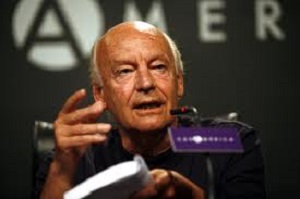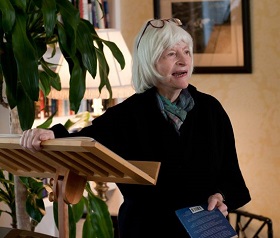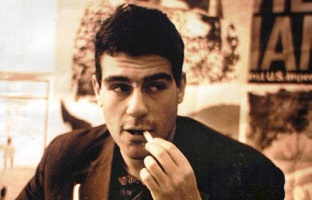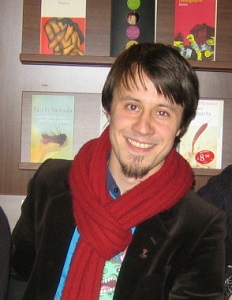|
De
Uruguayaanse schrijver, essayist en journalist Eduardo Hughes Galeano werd geboren op 3 september 1940 in Montevideo.
Zie ook mijn blog van 3 september 2010 en eveneens alle tags voor Eduardo Galeano op dit blog.
Uit:
Voices Of Time (Vertaald door Mark Fried)
Time Tells
We are made of
time.
We are its feet and
its voice.
The feet of time
walk in our shoes.
Sooner or later, we
all know, the winds of time will erase the tracks.
Passage of nothing,
steps of no one? The voices of time tell of the voyage.
The Voyage
Oriol Vall, who
works with newborns at a hospital in Barcelona, says that the first human
gesture is the embrace. After coming into the world, at the beginning of their
days, babies wave their arms as if seeking someone.
Other doctors, who
work with people who have already lived their lives, say that the aged, at the
end of their days, die trying to raise their arms.
And thats it,
thats all, no matter how hard we strive or how many words we pile on.
Everything comes down to this: between two flutterings, with no more
explanation, the voyage occurs.
Footprints
A couple was
walking across the savannah in East Africa at the beginning of the rainy
season. The woman and the man still looked a lot like apes, truth be told,
although they were standing upright and had no tails.
A nearby volcano,
now called Sadiman, was belching ash. The rain of ash preserved the couples
footprints, from that moment through time. Beneath their gray blanket, the
tracks remained intact. Those footprints show that this Eve and that Adam had
been walking side by side; at a certain point she stopped, turned away, and
took a few steps on her own. Then she returned to the path they shared.
The worlds oldest
human footprints left traces of doubt. A few years have gone by. The doubt
remains.

Eduardo Galeano (Montevideo, 3 september 1940)
De Amerikaanse schrijfster en literatuurwetenschapster Alison Lurie werd geboren op 3
september 1926 in Chicago, Illinois. Zie ook mijn blog van 3 september 2010 en eveneens alle tags voor Alison Lurie op dit blog.
Uit: Familiar
Spirits
At this time Jimmy
had not yet achieved the attentive, contained, charming manner of his later
years. He fidgeted with things, and was sometimes awkward and uneasy with strangers.
He misplaced ordinary objects, and did not know how to drive. He frequently
became panicky when faced with a mechanical or practical problem: a broken
window blind, frozen pipes, missing student papers, a canceled plane flight.
This, I felt then, was to be expected. I saw Jimmy as a kind of Martian:
supernaturally brilliant, detached, quizzical, apart. Naturally he was someone
with whom the invisible energies of this world would not cooperate, whom they
would trick and confuse. In a sense I was wrong: but in another sense I was
deeply right.
Whenever practical
things failed, Jimmy's friend David would come to the rescue. He was at ease in
the world: he calmed, he coped, he repaired and replaced and reassured. He
understood electricity and plumbing and automobile engines. Later, with David's
occasionally impatient encouragement, Jimmy would come to manage the practical
side of life better. He would own a VW beetle with the license plate POET and
drive it skillfully; he would learn to operate a computer, and become a
brilliant, inventive cook.
But from the start
Jimmy was in stunningly perfect control intellectually. His mind worked faster
than that of anyone I'd known: he could answer most questions before you
finished asking them. Words for him were like brilliant colored toys, and he
could build with them the way gifted children build with Lego blocks,
constructing and deconstructing elaborate, original architectural shapes and
fantastic machines.

Alison Lurie (Chigaco, 3 september 1926)
De Russische schrijver Sergej Dovlatov werd geboren op 3 september 1941 in Ufa, in
het zuiden van Rusland. Zie ook mijn blog van 3 september 2010 en eveneens alle tags voor Sergej Dovlatov op dit blog.
Uit:
Ours (Vertaald door Anne Frydman)
OK, so Im going to
try this one again. Ive tried to make my book reviews a little different by
inserting a bit of myself into each one. I say how they strike me personally.
When I first posted my review on Ours:
A Russian Family Album, it seemed that I flew too close to the sun. I touched
a nerve, one of my own.
I talked about my
family reunion in Las Vegas and how that struck me. But as I did that and I
read Dovlatov, who Ive become quite attached to, when I got to the chapter The
Colonel Says I Love You, the bottom fell out of everything. I had a realization
about him as Im working through my own stuff. Vague enough?
Anyway, going to
Vegas was pretty easy. Low expectations. I hadnt seen or talked to these
people in years. They had shown very little to no interest in me in all this
time. For all practical purposes, I was off to party with a bunch of strangers.
Strangers with good references. I could do that. Nothing was at stake. My
feelings were like iron.
So, then a funny
thing happened. There was this common thread, perhaps best attributed to my
imagination plus beer plus the heat. But the conversation flowed. Nothing
seemed labored. No airs were put on. There was some common ground. It was nice.
These people are
nothing like my husbands family, where you dont know they love you unless
they slice you open and rip out your heart. It sounds terrible, but it doesnt
hurt because you dont let yourself feel it. Thats what Im used to,
comfortable with. Anything that strays too close to real feeling is strictly
verboten.
Thankfully, my
husband still makes me laugh.
I went online
searching for videos of Dovlatov. There dont seem to be any from when he was
young. The ones I found show him as a hulking man, not really the writer type,
more the heavy weight boxer type. Very masculine.

Sergej
Dovlatov (3 september 1941 - 24 augustus 1990)
In 1965
De Indische
schrijfster Kiran Desai werd geboren op 3 september 1971 in New Dehli.
Zie ook mijn blog van 3 september 2010 en eveneens alle tags voor Kiran Desai op dit blog.
Uit: La perte en
héritage (Vertaald door Claude en Jean Demanuelli)
Les couleurs du
jour avaient été celles du crépuscule, la brume glissant comme une grande
créature marine aux flancs des montagnes habitées d'ombres et de profondeurs
océaniques. Visible par intermittence au-dessus de la vapeur, pic lointain
taillé au burin dans la glace, le Kanchenjunga accrochait les dernières lueurs
du couchant, couronné d'un panache de neige soulevé par les vents violents qui
soufflaient au sommet.
Assise sur la
véranda, Sai lisait un article sur le calmar géant dans un vieux numéro du
National Geographic. De temps à autre, elle levait les yeux sur le
Kanchenjunga, et, parcourue d'un frisson, contemplait sa phosphorescence
magique. Le juge assis à l'autre bout, face à son échiquier, jouait contre
lui-même. Recroquevillée sous sa chaise, où elle se sentait en sécurité, Mutt,
la chienne, ronflait doucement dans son sommeil. Une ampoule nue pendait à un
fil au-dessus de la scène. Il faisait froid, mais plus froid encore à l'intérieur,
où l'obscurité et l'air glacial étaient emprisonnés entre des murs de plus d'un
mètre d'épaisseur.
Ici, à l'arrière de
la maison, dans la caverne de la cuisine, le cuisinier essayait d'enflammer le
bois humide. Il manipulait les brindilles avec d'infinies précautions, de
crainte de déranger la communauté de scorpions qui vivaient, aimaient,
croissaient et se multipliaient dans le tas de bois. Un jour, il était tombé
sur une mère, gonflée de poison, ses quatorze bébés sur le dos.
Le feu finit par
prendre, et le cuisinier y posa sa bouilloire, dont les bosses et les
incrustations étaient dignes d'un objet excavé par une équipe d'archéologues,
et attendit que l'eau bouille. Les murs étaient roussis et détrempés, des aulx
pendaient aux poutres noircies par leurs tiges terreuses, la suie s'accrochait
ici et là au plafond en petits agrégats qui évoquaient des chauves-souris. Les
flammes dessinaient une mosaïque orangée et luisante sur le visage de l'homme,
la partie supérieure de son corps se réchauffait, mais un méchant courant d'air
lui torturait les genoux.

Kiran Desai
(New Dehli, 3 september 1971)
Onafhankelijk
van geboortedata:
De Duitse
dichter, schrijver en striptekenaar Lino Wirag werd geboren in 1983 in Pforzheim. Zie ook mijn blog van 3 september 2010 en eveneens alle tags voor Lino Wirag op dit blog.
Uit: Vom Verschwinden der Satire im
Literaturbetrieb
In wenigen
Bereichen ist die deutsche Teilung so augenfällig wie in der Satire: Titanic
wird in vielen ostdeutschen Städten überhaupt nicht verkauft, der Eulenspiegel
setzt im Westen wenig um. Er demonstriert, was Satire auch sein kann:
Beständigkeit trotz Wandel. Viele Redakteure und Zeichner arbeiten schon seit
Jahrzehnten für das Heft. Das Publikum schätzt die verlässliche Mischung aus
Politikerschmäh und Gesellschaftskritik. Hier »geißeln« »scharfe Federn«
»menschliche Missstände«, Aufklärer nehmen »kein Blatt vor den Mund«. Alte
Schule also.
Dass dieses Konzept aufgeht, ist verständlich, gab es bis zum Fall der Mauer im
Eulenspiegel doch keine politische Satire. Partei und Regierung durften nicht
Gegenstand der Autoren sein. Dafür gingen eine halbe Million Exemplare an die
DDR-Bürger. Pro Woche. »Im Mittelpunkt standen die Randerscheinungen« heißt es
in der Festschrift zum 50. Geburtstag, den man im Kreise der Lieben 2004
gefeiert hat. Einen Rest dieser Zurückhaltung hat sich die »Eule« bewahrt: Die
Witze bewegen sich in traditionellen, mitunter kabarettistischen Bahnen,
Zielscheiben werden genannt, Missstände überzeichnet, die Bürokratie wie in
alten Zeiten zum Hauptfeind des »gesunden Menschenverstands« erklärt: Satire
für den kleinen Mann und die breite Masse, wie der Eulenspiegel selbst sagt.

Lino Wirag (Pforzheim, 1983)
|



